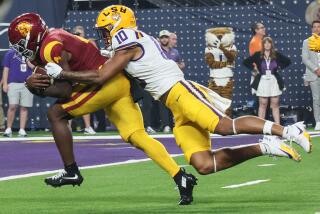PREVIEW ’91 : Winning (and Losing) the Economics Game
- Share via
The next 12 months may well provide an unprecedented bonanza for television sports viewers. But fans will get what they pay for, as cable and pay-per-view become more of a force than ever and the cash-strapped networks retrench and look for ways to stretch their programming dollars.
Highlights of televised sports ahead:
1992 will be the final time both the Winter and Summer Olympics will be held in the same year. CBS will present approximately 116 hours of coverage of the Winter Games from Albertville, France, Feb. 8-23, with cable’s Turner Network Television providing up to 50 additional hours.
NBC again has the Summer Olympics, with a planned 161 hours scheduled from Barcelona July 25-Aug. 9.
But there’s a new option for fans who don’t want to break away in mid-game from a Magic Johnson-led fast break to a Carl Lewis sprint. They can pay $95 to $170 for Olympic TripleCast, which will provide live, commercial-free uninterrupted coverage of 14 top Olympic sports on three pay-per-view channels.
Boxing fans are already looking forward to the scheduled Nov. 8 Evander Holyfield-Mike Tyson heavyweight championship bout in Las Vegas, which could become the sport’s most anticipated event since the first Muhammad Ali-Joe Frazier fight in 1971. The price of the Holyfield-Tyson fight is expected to be between $39.95 and $45.95. It’s been reported that this matchup could result in the richest pay-per-view gate of all time.
CBS will again present baseball’s World Series, golf’s Masters and PGA Championship, auto racing’s Daytona 500, the NCAA men’s basketball tournament and tennis’ U.S. Open. It is also CBS’ turn for the Super Bowl.
NBC’s top events include the NBA Finals and All-Star Game, Wimbledon and French Open tennis; horse racing’s Breeders’ Cup and the World Figure Skating Championships.
ABC counters with thoroughbred racing’s Triple Crown; the Indianapolis 500 and golf’s British and U.S. opens.
But all is far from rosy in the industry. High rights fees along with an inability to recoup them because of an advertising market battered by the recession, have forced ABC, CBS and NBC to cut costs in their sports departments. Production costs, announcer salaries, behind-the-scenes personnel and unprofitable events have all been reduced.
“What’s ruling the industry right now is money,” said Chet Forte, a nine-time Emmy Award-winning director and producer of such ABC events as “Monday Night Football,” the Olympics, the Indianapolis 500 and the World Series. Forte is now a talk show host on XTRA-AM in San Diego. “The industry is going backwards. We’re at a very bad time.”
Jon Miller, NBC Sports Vice President for Programming, is among those in the unaccustomed position of economizing.
“There’s not a whole lot you can do when in comes to your big sports (other than making) subtle changes in terms of production,” Miller said. “The big events--the NFL, NBA and Olympics won’t be affected. The anthologies and secondary and minor sports have taken a hit and will continue to take a hit and until the market place straightens itself out.
“There’s such an enormous amount of (events) available to the viewers and advertisers it makes the choices that much broader. As a result, as the economy continues to slug along, those programs that in the past were nice little profit centers are no longer that way.”
NBC has reduced its number of college basketball telecasts to 4, down from 24 in the 1987-88 season. Even before Donald Trump ran into his much-publicized problems, the network dropped cycling’s Tour de Trump, which was reborn this spring as the Tour Du Pont on CBS.
NBC is also shying away from soccer. The network carried the 1986 World Cup final and had the rights to the 1994 World Cup, but had its contract rejected by FIFA, the international governing body of soccer, because it was tied to a series of exhibition games played by the U.S. team. With the recession and the chilled market, FIFA isn’t expected to get what it would have gotten from NBC.
Although boxing ratings were good, costs have knocked the sport out on on the three major networks. HBO or its Time Warner pay-per-view corporate partner TVKO and rivals Showtime and Kingvision have been left with a near monopoly of live coverage of the top bouts.
Instead of boxing, NBC has turned in part to beach volleyball to fill its summer Sunday sports schedule. The network owns part of the Assn. of Volleyball Professionals tour, which has a sponsorship contract with Miller Lite beer. The latter assures the sale of commercial time, while the former allows NBC another opportunity for much-needed profit.
Another new profit source for NBC is the Heisman Trophy. NBC has bought the award emblematic of college football’s top player, and with it not only goes the show in which the winner is announced, but merchandising rights as well.
But these are just the first cost-cutting steps. ABC made the furthest leap by selling time 11 time slots to Raycom Sports, a Charlotte, N.C.-based syndicator, which will produce college basketball games for the network. That deal helped fuel speculation in the immediate future, one, two or all three major network sports departments may be reduced, with outside companies contracted to produce events, leaving a skeleton crew of announcers.
“You’re guess is as good as mine about what’s going to happen,” Forte said. “You’re going to see some shocking things, with networks saying, ‘To hell with it. We don’t need to keep 300 people here. We’ll keep 10 people here and farm the rest out.’ It doesn’t mean it’s going to be lousy, because there are an awful lot of good people outside the networks.”
More to Read
Go beyond the scoreboard
Get the latest on L.A.'s teams in the daily Sports Report newsletter.
You may occasionally receive promotional content from the Los Angeles Times.










